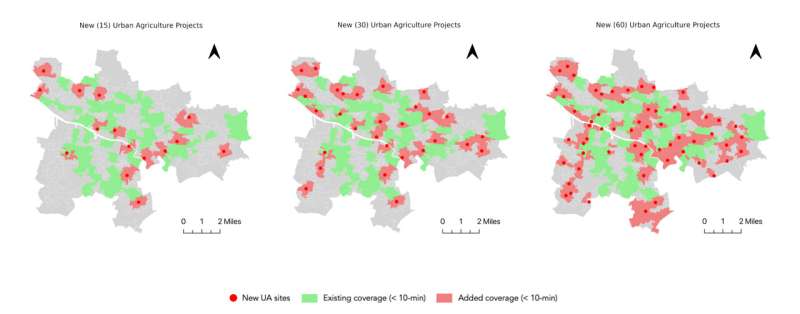This article has been reviewed according to Science X's editorial process and policies. Editors have highlighted the following attributes while ensuring the content's credibility:
fact-checked
trusted source
proofread
Urban agriculture study seeks to alleviate Glasgow's 'food deserts'

A fresh approach to urban agriculture could help Glasgow's 'food deserts' flourish into sources of healthy, affordable produce to help reduce inequality, new research suggests.
Sophisticated geospatial analysis of the city, conducted by researchers at the University of Glasgow and Florida State University, U.S., has revealed how much vacant and derelict land is spread across the city—and how adding just a handful of new community gardens or allotments could significantly boost access to fresh produce in more deprived areas.
The team's paper, titled "Equalizing urban agriculture access in Glasgow: A spatial optimization approach," is published in the International Journal of Applied Earth Observation and Geoinformation.
Urban agriculture like community gardens and allotments can have many benefits for residents, including increasing the availability of fresh affordable produce, building community connections, exchanging knowledge about food, and improving mental well-being from being outdoors and active.
The researchers, from the University's School of Geographical and Earth Sciences, found that just 36% of city residents currently live within a 10-minute walk of an urban agriculture spot where fresh fruit and vegetables can be grown.
Their analysis showed that city center residents generally have better access than those living at the edges of Glasgow, where more economically deprived areas tend to be clustered. In those more deprived areas, access to cheap, fresh food can be limited, creating spaces sometimes called 'food deserts.'
The researchers found that there are currently 939 hectares of vacant and derelict land scattered across the city, with around 60% of the city's population living within 500 meters of an unused space.
Using a technique called spatial optimization modeling, the team examined how unused space could be converted into community gardens or allotments to maximize city residents' access.
The team's analysis showed that turning just 15 derelict sites in locations including Castlemilk, Drumchapel and Toryglen into urban agriculture hubs could help expand convenient access to fresh fruit and vegetables to 50% of residents, which could have a significant impact on reducing food inequality.
Adding up to 60 new sites within a 10-minute walk for local people could boost access to up to 70% of the city's population, which the researchers say would reduce inequality of access to a statistically insignificant level.
The team's findings have been published as a paper in the International Journal of Applied Earth Observation and Geoinformation.
Dr. Mingshu Wang, of the University of Glasgow's School of Geographical Earth Sciences, is one of the paper's co-authors. He said, "Infamously, Glasgow has one of the shortest life expectancies in Europe, exacerbated by stark inequalities between residents of the most and least affluent areas of the city.
"Part of the cause of this 'Glasgow effect' is a lack of access to affordable, nutritious food in lower-income areas of the city, combined with limited opportunities for outdoor activities.
"This research provides the basis for a data-driven approach to urban planning which could help address some of the city's most challenging problems without the need for huge investment."
Dr. Ziqi Li, of Florida State University's Department of Geography, is the paper's corresponding author. Dr. Li is a former lecturer and an honorary research fellow at the University of Glasgow's School of Geographical & Earth Sciences.
Dr. Li said, "Previous research has shown that in areas with higher densities of vacant land, residents often suffer from higher occurrences of mental health issues like anxiety, depression and psychosis. When that is combined with the physical health effects of living in food deserts, there's a very strong case to be made for the value of turning those unused spaces into community agriculture hubs.
"Community gardening gives people the power to grow their own healthy food, and creates green spaces for social interaction, stress relief and exercise.
"Our study shows that Glasgow has the potential to create new solutions to tackling the Glasgow effect by finding better use for the vacant land across the city, and involving local people in making positive changes to their communities. There is evidence of this success to demonstrate the possibility including the Concrete Garden project in North Glasgow's Possilpark area and the award-winning Woodlands Community Garden."
The research began as a thesis written by University of Glasgow MSc student in Geoinformation Technology & Cartography, Amy Russell, who was jointly supervised by Dr. Wang and Dr. Li.
She said, "Our hope is that this study will help lead to new conversations between community groups and decision-makers across Glasgow regarding putting vacant and derelict land to better use. Our research shows that small changes to land use could provide opportunities to grow affordable food in areas where people need it most."
More information: Amy Russell et al, Equalizing urban agriculture access in Glasgow: A spatial optimization approach, International Journal of Applied Earth Observation and Geoinformation (2023). DOI: 10.1016/j.jag.2023.103525
Provided by University of Glasgow





















